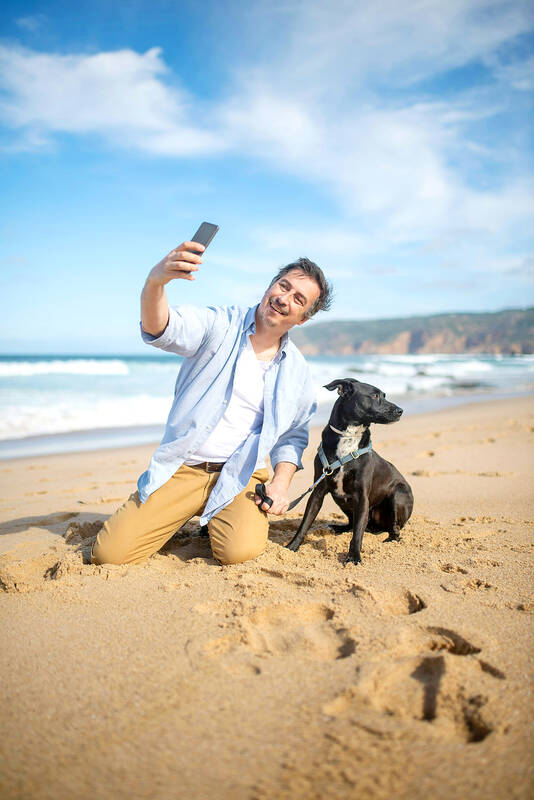對話 Dialogue
清清:夏天就要到了,好想出去玩喔!
Qīngqing: Xiàtiān jiù yào dàole, hǎo xiǎng chūqù wán o!

Photo courtesy of Pexels 照片:Pexels提供
華華:下個月剛好有端午連假,可以規劃一下啊!你想去哪裡玩呢?
Huáhua: Xià ge yuè gānghǎo yǒu Duānwǔ liánjià, kěyǐ guīhuà yíxià a! Nǐ xiǎng qù nǎlǐ wán ne?
清清:嗯……,這次我想去離島走走,澎湖、金門、馬祖都好。
Qīngqing: En… zhè cì wǒ xiǎng qù lídǎo zǒuzǒu, Pénghú, Jīnmén, Mǎzǔ dōu hǎo.
華華:那你想坐飛機還是坐船去?離島的風景非常美,也極有特色,但交通是最大的問題。
Huáhua: Nà nǐ xiǎng zuò fēijī háishì zuò chuán qù? Lídǎo de fēngjǐng fēicháng měi, yě jí yǒu tèsè, dàn jiāotōng shì zuìdà de wèntí.
清清:我想坐船,因為我也想帶著我的狗狗去。要是送牠去住寵物旅館,我覺 得牠一定會哭個好幾天,我不想為了去玩而讓牠難過。但帶狗坐飛機很麻煩,牠也不能跟我坐在一起。
Qīngqing: Wǒ xiǎng zuò chuán, yīnwèi wǒ yě xiǎng dàizhe wǒ de gǒugou qù. Yàoshì sòng tā qù zhù chǒngwù lǚguǎn, wǒ juéde tā yídìng huì kū ge hǎojǐ tiān, wǒ bùxiǎng wèile qù wán ér ràng tā nánguò. Dàn dài gǒu zuò fēijī hěn máfán, tā yě bùnéng gēn wǒ zuò zài yìqǐ.
華華:那你可以去澎湖或是馬祖,這兩個地方都可以從本島坐船去。但帶寵物去離島,必須先準備好一些文件,像是狂犬病預防注射證明、寵物登記證明,出發以前都要確認好相關訊息。
Huáhua: Nà nǐ kěyǐ qù Pénghú huò shì Mǎzǔ, zhè liǎng ge dìfāng dōu kěyǐ cóng běndǎo zuò chuán qù. Dàn dài chǒngwù qù lídǎo, bìxū xiān zhǔnbèi hǎo yìxiē wénjiàn, xiàngshì Kuángquǎnbìng Yùfáng Zhùshè Zhèngmíng, Chǒngwù Dēngjì Zhèngmíng, chūfā yǐqián dōu yào quèrèn hǎo xiāngguān xùnxí.
清清:謝謝你提醒我,我先看看船票的情況,也還要找找有沒有適合的寵物友 善旅館,再跟船公司洽詢帶狗坐船的細節。
Qīngqing: Xièxie nǐ tíxǐng wǒ, wǒ xiān kànkan chuánpiào de qíngkuàng, yě hái yào zhǎozhao yǒu méiyǒu shìhé de chǒngwù yǒushàn lǚguǎn, zài gēn chuán gōngsī qiàxún dài gǒu zuò chuán de xìjié.
華華:你也可以考慮考慮要不要租車,這樣帶毛家人在當地玩會比較方便。先祝你們有個愉快的旅程喔!
Huáhua: Nǐ yě kěyǐ kǎolǜ kǎolǜ yào búyào zūchē, zhèyàng dài máojiārén zài dāngdì wán huì bǐjiào fāngbiàn. Xiān zhù nǐmen yǒu ge yúkuài de lǚchéng o!
翻譯 Translation
Qingqing: Summer is coming, I really want to go out and play!
Huahua: Next month happens to be the Dragon Boat Festival holiday. You can plan something! Where would you like to go?
Qingqing: Hmm... this time I want to visit some offshore islands, like Penghu, Kinmen or Matsu.
Huahua: Do you prefer to fly or take a boat there? The scenery on the islands is stunning and unique, but transportation can be a challenge.
Qingqing: I want to take a boat because I want to bring my dog along. I feel like if I leave him at a pet hotel, he’ll be sad for days, and I don’t want to make him unhappy just for a trip. But it’s a pain to fly with a pet, and he can’t sit with me either.
Huahua: Then you might consider Penghu or Matsu. Both places are accessible by boat from Taiwan. But bringing pets to the islands requires some preparation, such as proof of rabies vaccination and pet registration. Make sure to confirm all the necessary information before departure.
Qingqing: Thank you for reminding me. I’ll check the availability of boat tickets first and see if there are any pet-friendly hotels. Then I’ll inquire with the ferry company about the details of bringing a dog on board.
Huahua: You might also consider renting a car, which would make it more convenient to travel with your furry family member locally. I wish you all a pleasant journey!
生詞 Vocabulary
1. 寵物 (chǒngwù) pet
2. 離島 (lídǎo) offshore island, outlying island
3. 端午 (Duānwǔ) Dragon Boat Festival
4. 牠 (tā) it (for animals)
5. 文件 (wénjiàn) document
6. 狂犬病 (kuángquǎnbìng) rabies
7. 預防注射 (yùfáng zhùshè) vaccination
8. 細節 (xìjié) details
教材音檔 Audio Files
國立清華大學華語中心提供
By National Tsing Hua University Chinese Language Center:

In an effort to fight phone scams, British mobile phone company O2 has introduced Daisy, an AI designed to engage phone con artists in time-wasting conversations. Daisy is portrayed as a kindly British granny, exploiting scammers’ tendency to target the elderly. Her voice, based on a real grandmother’s for authenticity, adds to her credibility in the role. “O2” has distributed several dedicated phone numbers online to direct scammers to Daisy instead of actual customers. When Daisy receives a call, she translates the scammers’ spoken words into text and then responds to them accordingly through a text-to-speech system. Remarkably, Daisy

Bilingual Story is a fictionalized account. 雙語故事部分內容純屬虛構。 Emma had reviewed 41 resumes that morning. While the ATS screened out 288 unqualified, she screened for AI slop. She could spot it a mile away. She muttered AI buzzwords like curses under her breath. “Team player.” “Results-driven.” “Stakeholder alignment.” “Leveraging core competencies.” Each resume reeked of AI modeling: a cemetery of cliches, tombstones of personality. AI wasn’t just changing hiring. It was draining the humanity from it. Then she found it: a plain PDF cover letter. No template. No design flourishes. The first line read: “I once tried to automate my

Every May 1, Hawaii comes alive with Lei Day, a festival celebrating the rich culture and spirit of the islands. Initiated in 1927 by the poet Don Blanding, Lei Day began as a tribute to the Hawaiian custom of making and wearing leis. The idea was quickly adopted and officially recognized as a holiday in 1929, and leis have since become a symbol of local pride and cultural preservation. In Hawaiian culture, leis are more than decorative garlands made from flowers, shells or feathers. For Hawaiians, giving a lei is as natural as saying “aloha.” It shows love and

1. 他走出門,左右看一下,就過了馬路。 ˇ He walked outside, looked left and right, and crossed the road. χ He walked outside and looked left and right, crossed the road. 註︰並列連接詞 and 在這句中連接三個述語。一般的結構是 x, y, and z。x and y and z 是加強語氣的結構,x and y, z 則不可以。 2. 他們知道自己的弱點以及如何趕上其他競爭者。 ˇ They saw where their weak points lay and how they could catch up with the other competitors. χ They saw where their weak points lay and how to catch up with the other competitors. 註:and 一般連接同等成分,結構相等的單詞、片語或子句。誤句中 and 的前面是子句,後面是不定詞片語,不能用 and 連接,必須把不定詞片語改為子句,and 前後的結構才相等。 3. 她坐上計程車,直接到機場。 ˇ She took a cab, which took her straight to the airport. ˇ She took a cab and it took her straight